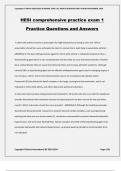Exam (elaborations)
HESI comprehensive practice exam 1 Practice Questions and Answers
HESI comprehensive practice exam 1
Practice Questions and Answers
A client with asthma receives a prescription for high blood pressure during a clinic visit. Which
prescription should the nurse anticipate the client to receive that is least likely to exacerbate asthma? -
ANSWER-The best antihyp...
[Show more]
Preview 3 out of 28 pages
Uploaded on
November 3, 2024
Number of pages
28
Written in
2024/2025
Type
Exam (elaborations)
Contains
Questions & answers
Institution
Hesi
Course
Hesi
$12.49
100% satisfaction guarantee
Immediately available after payment
Both online and in PDF
No strings attached
Copyright © KAYLIN 2024/2025 ACADEMIC YEAR. ALL RIGHTS RESERVED FIRST PUBLISH NOVEMBER, 2024




